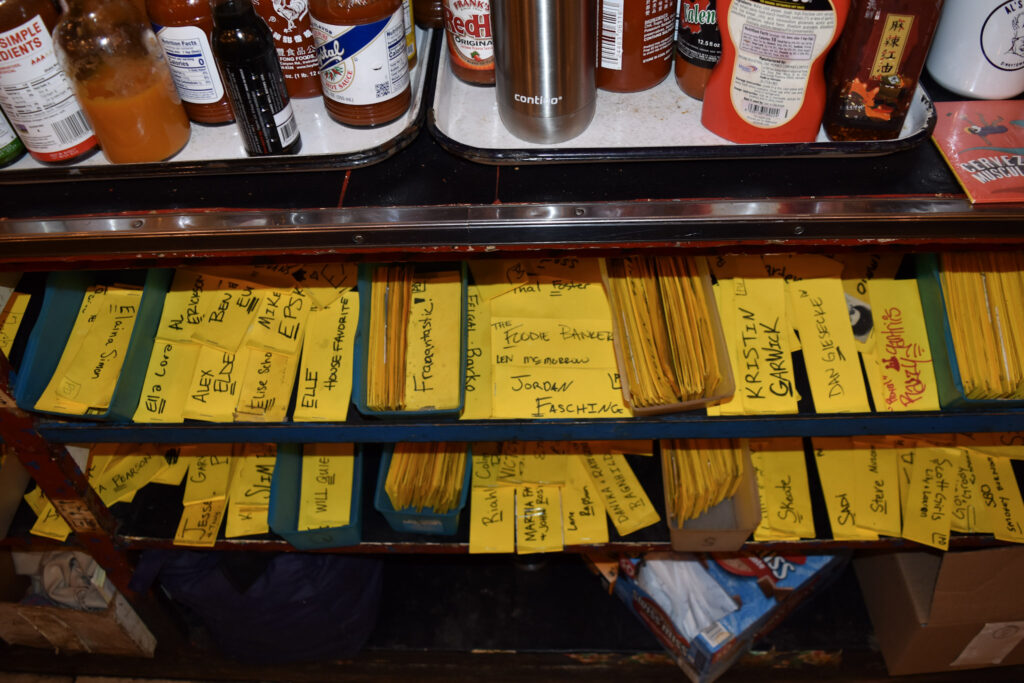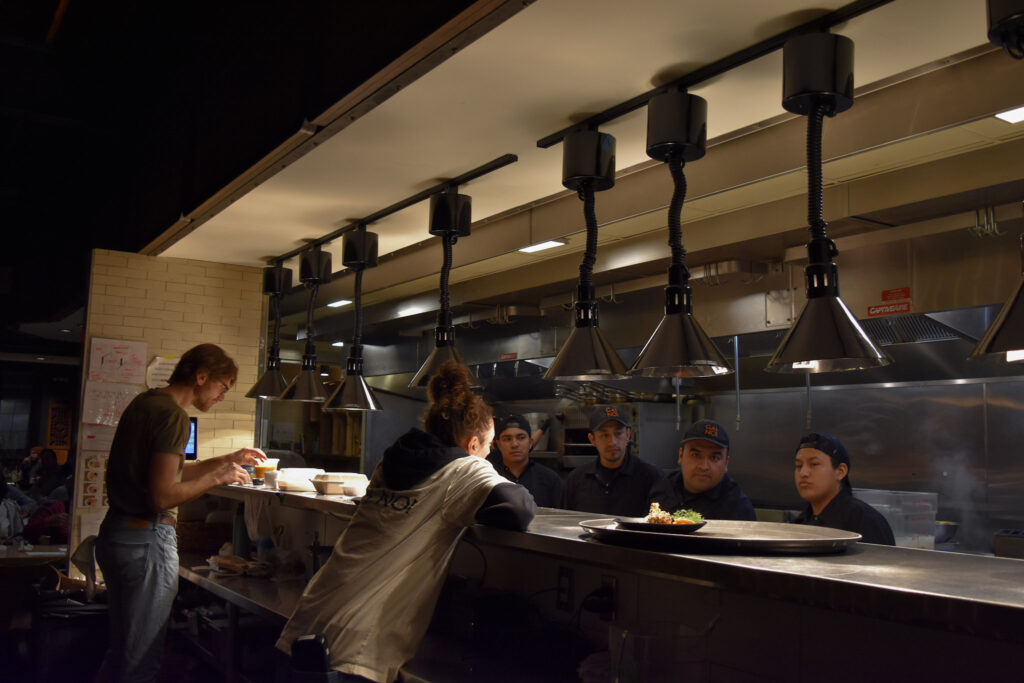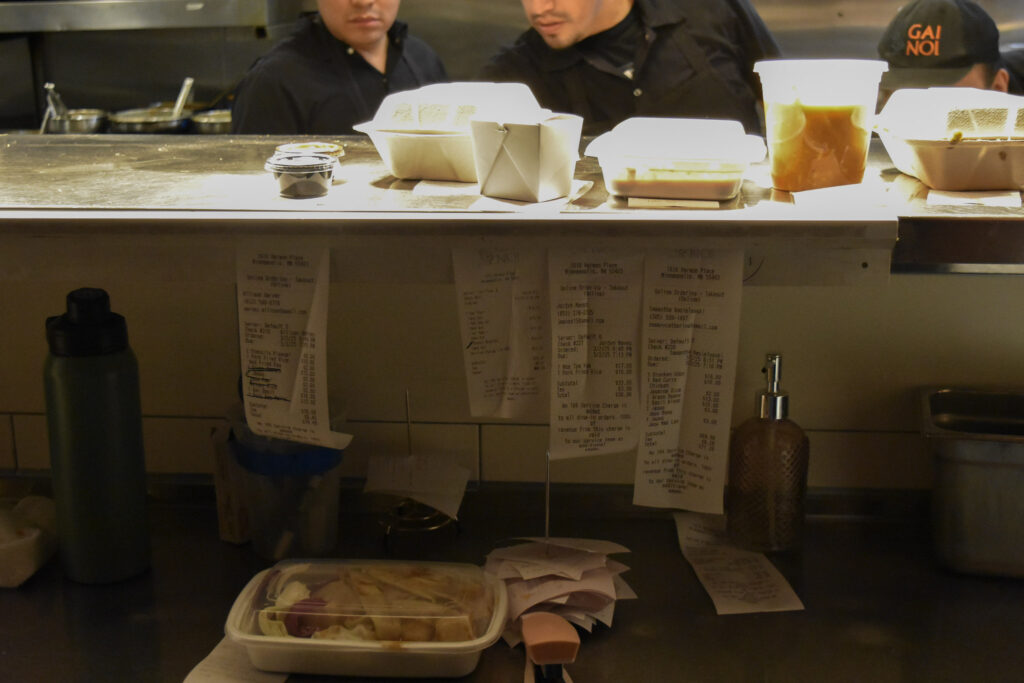By: Isabella Caswell
At Al’s Breakfast, a narrow slice of Dinkytown that has been getting people going in the morning for the past 75 years, there is no microwave, deep fryer or freezer. And there is no takeout menu.
Founded by Al Bergstrom in 1950, the restaurant is still laid out for optimal socialization. Customers sit at the counter elbow to elbow, and they can see everything being cooked.

Al’s does not offer takeout orders online or from the phone number. Current owner Alison Kirwin said they can only handle the customers who come in since it’s so small. But Al’s does offer to-go boxes to customers who order in person. And if you can’t finish your breakfast, you can box it up and take it with you.
Al’s has taken a stand on one side of a takeout divide in today’s food industry. Perhaps it is the lingering effects of the pandemic or inflation, but according to the Ispos marketing research firm, 45% of those surveyed said they cook dinner at home more often since the start of 2024. That’s in addition to those who prefer to take out their restaurant food rather than dine in. Escoffier School of Culinary Arts recorded that 57% of Americans preferred ordering takeout or delivery in 2024.
While customers may prefer it, offering takeout often is not such an easy call for restaurants. You’ll miss the social aspects of dining in, and the food probably won’t be as good by the time you get it home. But in the end, restaurants need to make money.
Costs of Takeout
To Kirwin, who worked as a waitress at Al’s for nearly 20 years before buying it, getting takeout from a restaurant detracts from the experience. Restaurant workers at Al’s put a lot of effort into making quality dishes. Kirwin believes restaurants are meant to be sat in. The vibe of the restaurant adds to the experience of eating the food.
“If you’re sitting and having a conversation with somebody, and you’re smelling things and hearing things and whatever else, I think that’s a valuable part of dining out,” Kirwin said.

There often is a cultural element, as well. Gai Noi, a family-style Laotian restaurant located on the outskirts of Loring Park, opened in May 2023. Customers typically order several shareable plates and eat a mixture of what their party ordered.
General Manager Minh Tran said the way Gai Noi serves dishes as soon as they are hot and ready pays respect to how Southeast Asians view food culture. Tran immigrated to the U.S. from Vietnam and appreciates Gai Noi’s service values.
“If you put in all that work and you don’t serve it immediately to your guests as soon as it’s hot and ready, it’s considered an insult,” Tran said.
Tran also believes that customers who choose takeout opt out of experiencing the personalities of staff and guides to the menu. American customers need a guide to understand Laotian cuisine if they want to truly experience something new.
“The absolute best way to experience our food is to come in, sit down and experience what it really means to dine as if you were an Asian person,” Tran said.

Effort to Restore a Legacy
Food delivery services such as Uber Eats and DoorDash take a commission on delivery orders. Annie’s Parlor, just off University Avenue in Dinkytown, added a DoorDash option for takeout in January and Uber Eats in March. Andrew Shackett, director of restaurant operations, said it is a small price to pay in order to make Annie’s food more accessible.
Annie’s originally opened in 1974, and it is a hotspot for nostalgia, Shackett said. The diner closed in 2020 and reopened in early 2024. The time gap forced a generation of college students to miss the Annie’s experience.

People come into Annie’s all the time because it was a significant part of their time in college, according to Shackett. It was people’s favorite place to go for a bite in Dinkytown. It was a place where people met their significant others and made friends.
Annie’s is not seeing the name numbers as it did before it closed during the COVID-19 pandemic. Shackett is hoping takeout might restore Annie’s legacy of being a popular community spot to eat and grab a milkshake.
“Takeout is one way we can expand to younger generations, but also be the spot that Annie’s used to be on campus,” Shackett said.
On the other hand, the burgers are not as hot and the milkshakes melt in the takeout delivery process.
Staff to Interact With
The owner of Gai Noi, Ann Ahmed, aimed to create a more approachable and accessible space for people to enjoy Southeast Asian cuisine. For the management, a good part of that formula depends on treating the staff right, and how staff members interact with each other and customers.
Gai Noi prioritizes employees with a unique business model. The Laotian restaurant is a non-tipping establishment with an 18% service fee. All front-of-house employees are paid the same, Tran said. This encourages employees to help each other out and leads to a more supportive environment.
Gai Noi has consistent revenue, and that has not changed since it opened. The restaurant also has several regulars on a first-name basis with the staff.
Gai Noi does offer takeout but does not apply the service charge to those orders which means that employees do not benefit as much from takeout orders.

The restaurant staff works hard to hire diverse and personable employees. Tran wants Gai Noi to be a safe, comfortable space for customers and for employees alike. He wants customers to come in and feel that everyone can be themselves.
Tran wants Gai Noi to be a haven for LGBTQ+ people as well, especially during a time when hate speech is on the rise. Moses Mohamoud, a front-of-house employee, is openly bisexual and has worked at Gai Noi since it opened. He looks forward to going to work.
“I feel confident when I come in here rather than out there,” Mohamoud said. “I’ve stayed here because I enjoy it.”
Mohamoud meets a lot of people and makes friends with customers. He is comfortable being himself, and when people ask, he shares his coming out story.
He said that when Beyoncé came to Minneapolis during her Renaissance Tour, some of her dancers went to Gai Noi before the show. Mohamoud did not know who they were when he shared his story with the dancers. They ended up offering him a ticket to Beyonce’s concert.
“I love sharing my story, you know?” Mohamoud said. “I want to be a voice to somebody that may need it.”
If you don’t come in, chances are you’ll miss that. It might be a good idea to dine out. Tran said, “When you choose to come here, you’re supporting so, so, so many people at once.”

